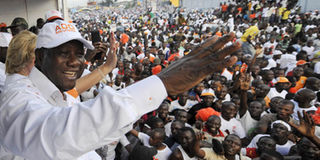Ivorians vote in key presidential poll

AFP | PHOTO. Ex-prime minister Alassana Dramane Ouattara (left), candidate for the Rassemblement Démocratique pour la République, (RDR) for the presidential elections on October 31, 2010 greets the crowd of sympathisers during an electoral campaign through the streets of Abidjan on October 29, 2010.
ABIDJAN, Sunday
Voters turned out in large numbers in key cities in Côte d'Ivoire's first election in a decade Sunday aimed at ending years of political turmoil in the divided former West African powerhouse.
Crowds gathered in the main city Abidjan and in Bouake, the northern stronghold of former rebel forces, even before polling stations opened at 0700 GMT, AFP reporters said.
"I am very proud to have voted," said student Nastase Kehi, 26, after casting his first ever ballot in the capital's Port-Bouet district, where long lines of voters formed in the early hours.
Kehi said he had no worries about the election and a possible resurgence of violence which has seen polls scheduled for 2005 put off six times. "We Ivorians are wise enough not to get carried away, to turn violent," he said.
"We are fed up with the situation in our country. Let the winner win and let us move on," said Oumarou Kouyate, 30, voting in the same district.
In some areas in Abidjan and in Adjame and Yopougon in the north, polling stations were late in opening and voters complained about a lack of transport but the mood remained buoyant.
Around 5.7 million people are eligible to vote in the first election in a decade in the world's top cocoa-producing country, where incumbent Laurent Gbagbo, 65, leads a field of 14 candidates.
"There has not been an election since 2000 and we really have to have a change because Ivorians are suffering, especially the young," said student Mylene Kouassi, 22.
Gbagbo's main rivals are ex-president Henri Konan Bedie, 76, and former prime minister Alassane Ouattara, 68. All three believe they will win, raising fears of unrest when the results come through next week.
Bedie is seeking a comeback after being overthrown in a military coup in 1999 that triggered years of turbulence in the former French colony once hailed as an example of stability and an economic miracle.
Gbagbo came to power in a 2000 election from which Bedie and Ouattara were excluded, and survived a coup attempt two years later that escalated into a full-scale civil war in which thousands were killed.
Gbagbo insisted that he would win the poll, putting the blame on his opponents for any violence.
"The violence will come from those who lose. And ... I am not going to lose," Gbagbo said in an interview with French newspaper Journal du Dimanche on the eve of the election.
The civil war split the country in two between Gbagbo's government-controlled south and the north held by former New Forces rebels, with UN and French peacekeepers patrolling a buffer zone between them.
Despite occasional outbreaks of deadly violence, a March 2007 peace accord has held and a disarmament programme has meant that areas of the north have gradually returned to government control.
Gbagbo postponed presidential elections six times since the end of his term in 2005 amid rows over rebel disarmament and voter registration.
He told the Journal du Dimanche that he remained in office five years beyond the official end of his mandate because of the conflict.
"I stayed in power for 10 years because there was a war. I am proud to have kept in place the republic's institutions," he said.
Newspapers have billed the vote as a "day of truth" for the country, with polling due to close at 1700 GMT.
The Independent Electoral Commission has three days to announce provisional results but aims to do so on Monday, an official told AFP.
Election authorities have said that speed is of the essence so that no camp can unilaterally claim victory or qualification for a run-off, which could trigger confusion and violence.
Thousands of government troops, former rebel fighters, police and UN peacekeepers are deployed to secure the poll.
The government announced Saturday that the borders were sealed and would remain closed until 6:00 pm Tuesday to prevent troublemakers trying to flee after stirring up unrest.
The international community, including the United States and UN Security Council, has encouraged the rival parties to ensure the election is fair and transparent.
The vote is a "critical step to rebuilding" Ivory Coast, US President Barack Obama said last week.




